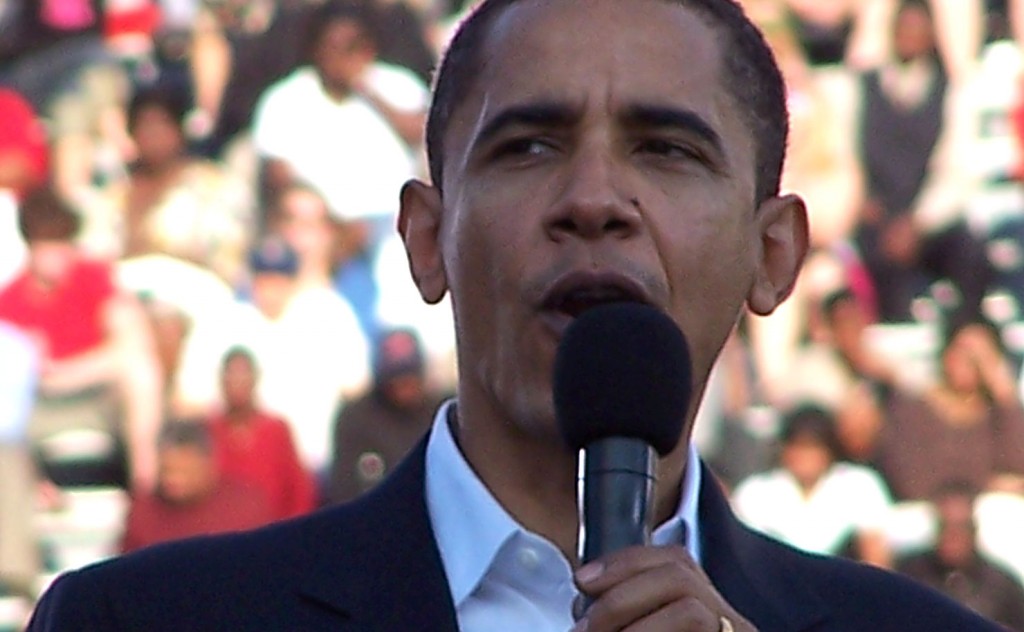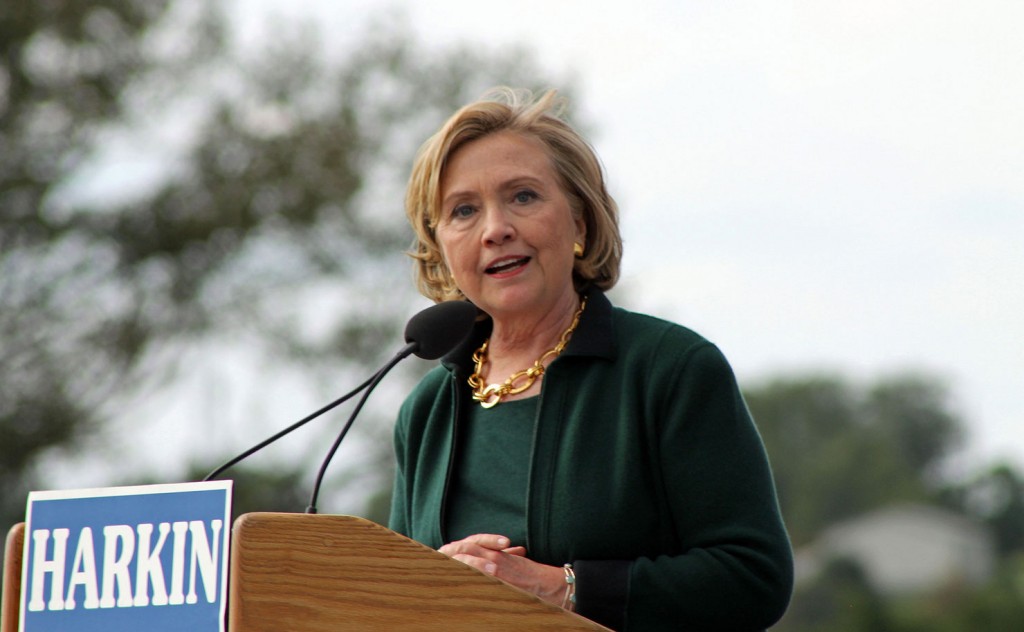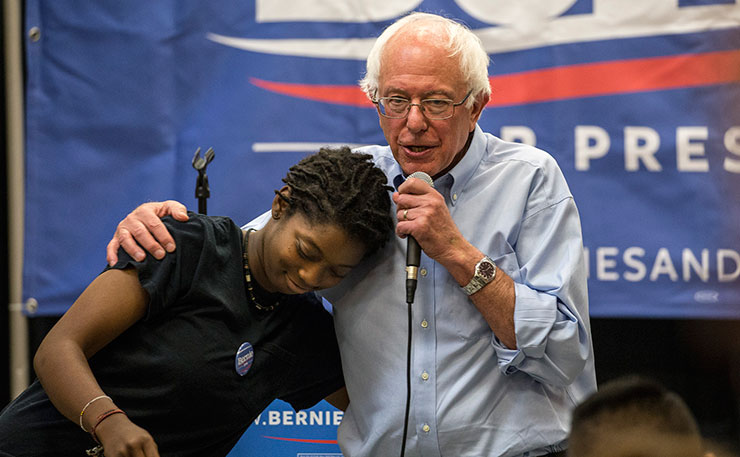OPINION: As Bernie Sanders horsewhips Hillary Clinton in the New Hampshire primaries (happening as this story goes to press) Lizzie O’Shea argues that voting for Clinton because you believe she has the best chance of beating Donald Trump is not only a cop-out, but it ignores a growing grassroots reality.
Pragmatism is more complicated than it looks when you haven’t bothered to do the research. It’s easier to just command, as New Matilda’s correspondent did recently, that we back Hillary Clinton because she’s the grown up choice.
This appeal to adult-styled political realism ends up being the worst kind of elitism dressed up as anti-elitism.
Really, we should all realise that the poor white working class love God and guns, not policies directed at social welfare. It’s a nasty sleight of hand to make pretensions of defending poor people by claiming Sanders supporters are white elitists who can somehow better afford to argue for universal health care.
Of course, the reality is that the truly pragmatic American democrat voter should be supporting Sanders for the nomination, contrary to the expectations of many, as he is currently a safer bet than Clinton against every Republican candidate.
Lest you think this is something to do with his charisma, the political polling is backed by a range of more specific policy polling. A majority of Americans, for example, support a single-payer health care system (and vastly more strongly favour it than those who strongly oppose).

A majority of Americans support Obama’s plan for free college for two years, and concur with the statement that ‘no family and no student should have to borrow to pay tuition at a public college or university.’
Unsurprisingly, most Americans also think the rich do not pay enough tax. Hence, Sanders is perhaps better understood not as a radical, but rather someone who is appealing to the actual base of the Democratic Party.
Sanders hasn’t been attacked properly by the right yet, obviously, and this is the other main reason why Clinton supporters claim they have the more sensible candidate.
The Koch brothers have nearly $900 million to spend. The electorate knows Clinton better than Sanders, suggesting she will better be able to weather this blitzkrieg of attack spending. But the reality is that such a war chest remains a serious threat to any non-Republican contender for President.
This is not an issue about Sanders’ ideas (or even Clinton’s) but rather it poses a serious question about how to fix the corrupt campaign finance system. In other words, the problem here is not that Sanders is less popular with billionaires, it is that such a consideration ought to be factoring into such a decision at all.
Most of us don’t make all political decisions based on pragmatism, many of us have imaginations and are dedicated to concepts like equality and human dignity.
By arguing that Clinton is the ‘adult’ choice, you are advocating that the real purpose of social democracy is to facilitate ‘a peaceful way for elites to circulate between government and their other posts.’
Most people think democracy is about something more than that. They have every right to do so. But we also better think carefully about how to transform our current system into something that genuinely reflects principles of democracy and equality.

Sanders is certainly not a perfect political candidate. But his popularity is interesting not because of him personally, nor really the potential of his Presidency. Rather we need to take it seriously because it gives us a chance to intervene into a highpoint of a kind of public thinking and politicisation that did not start with Sanders, but has been building for a time.
From the Occupy movement to the popularity of Piketty’s Capital, it is no surprise in many ways that the persistent problem of economic inequality has muscled itself into the US Presidential race in the form of Sanders.
It comes at a time when a whole generation has come of age free from the shadow of Stalinism and associated triumphalism of capitalism, claiming the end of history.
The idea of trickle down economics has been debunked. The financial crisis triggered by sub-prime demonstrated not only the fragility of capitalism and its tendency to crisis, but also its resilience in being able regroup and redirect its wealth to the elite. Democratic socialism starts to look pretty good.
The question is what happens next with this kind of political will. My fear is not if Sanders wins, but rather if he pulls out and falls into line with Clinton.
The support Sanders had built, with 3 million individual contributions and over 1 million donors, should not just revert automatically to a hawkish, establishment Democrat.
This is the time to be arguing why social movements need to pick up this momentum and run with it, not let it be funnelled into Clinton’s campaign.
This is the moment to try and build lasting movements that can genuinely pose challenges to the 1 per cent, includes movements such as the Fight for $15, Black Lives Matter, the shift to a sustainable economy and the growing consensus around paid sick and parental leave.
It is easy to fear for the future if such discussions are left to the current political commentariat. One of the most fascinating things about living in the USA at the moment is watching how craven and small-minded many political commentators can be, especially those who claim to be progressive.

The New Yorker has disparaged young people as having a kind of ‘retro’ historical fetishism’ for a candidate who seems to speak to their actual lived experience. Then there is the whole sorry saga that is the ‘Bernie Bro’. Let alone the tiresome patronising of many celebrity and establishment feminists.
These are salutary lessons to learn and remember. Who is validating their personal superiority by taking the ‘sombre pleasure of condemning things’, as Rebecca Solnit describes it? Because next time one of these commentators passes judgement on a social movement or political issue, we should be reminded of these moments when they gave up on imagination and principle.
These people seem to want to avoid making demands on power; they want their crops without having to plough up the ground. We should not forget that they preferred to preserve their smug virtue by rallying behind the powers that be, rather than commit to the genuinely difficult task of creating a new society.
Perhaps something to ponder as we seek not to remember the Sanders campaign as the start of something, but rather to imagine it is something more than the end point.
Donate To New Matilda
New Matilda is a small, independent media outlet. We survive through reader contributions, and never losing a lawsuit. If you got something from this article, giving something back helps us to continue speaking truth to power. Every little bit counts.





